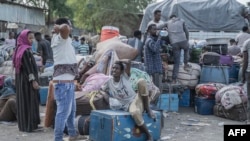"The situation got worse each day," Sara told AFP, adding: "It's sad, it's upsetting, it's disappointing."
She arrived in Metema around the end of April and fears being stuck there for a long time, with no clarity on whether she will have to refile her application for asylum.
She has not yet been able to register with the United Nations High Commission for Refugees [UNHCR] office there.
"They said it's going to be a long and continuous process that is going to take months," she said.
Others are also in limbo.
Sara was born in Khartoum after her mother fled Eritrea for Sudan more than two decades ago.
The 24-year-old was due to leave for Canada on April 17 after her mother moved there six months earlier.
But when fighting broke out in Khartoum on April 15, her plans fell into disarray, she said.
"The situation got worse each day," she told AFP, adding: "It's sad, it's upsetting, it's disappointing."
She arrived in Metema around the end of April and fears being stuck there for a long time, with no clarity on whether she will have to refile her application for asylum.
She has not yet been able to register with the UNCHR office there.
"They said it's going to be a long and continuous process that is going to take months," she said.
Sina, who only wanted to be identified by her first name, fled to the country in 2018 after enduring four years of harsh military service in Eritrea, an authoritarian state with a notorious policy of universal, indefinite conscription.
The 24-year-old who worked as a waitress in Khartoum said she was devastated to leave Sudan.
"I was so happy with my new life," she told AFP, sheltering under a makeshift tarpaulin roof.
She fled to Metema with her boyfriend and his brother, the trio packing up their lives into two suitcases.
"We have no proper shelter, the water supply is not enough, I have no money."
And worst of all, no immediate prospects for the future.
"If I go back to Eritrea I will get punishment, prison, then I will be sent back to (the) military," she added.
April 15 began like any other day, Salam Kanhoush said, recounting plans to go kayaking on the Nile with friends.
But he soon began receiving messages urging him not to leave his house.
He spent over a week holed up in his home, including a few days with no electricity or water supply, before finally managing to leave Sudan's capital, carrying only a backpack.
"I left a lot of things behind, it was really hard to take the decision to leave Khartoum because... I had to leave a lot of memories," he told AFP.
His graduation project remains unfinished and his passport stuck at the Syrian embassy in Khartoum where it was in the process of being renewed.
He cannot leave Metema without travel documents and "going back to Syria is not an option."
"What I have is everything I have."





![ICRC in Sudan Welcomes Jeddah Humanitarian Declaration [4:57]](https://gdb.voanews.com/01000000-0aff-0242-3e54-08db48ba8f3b_w33_r1.jpg)




